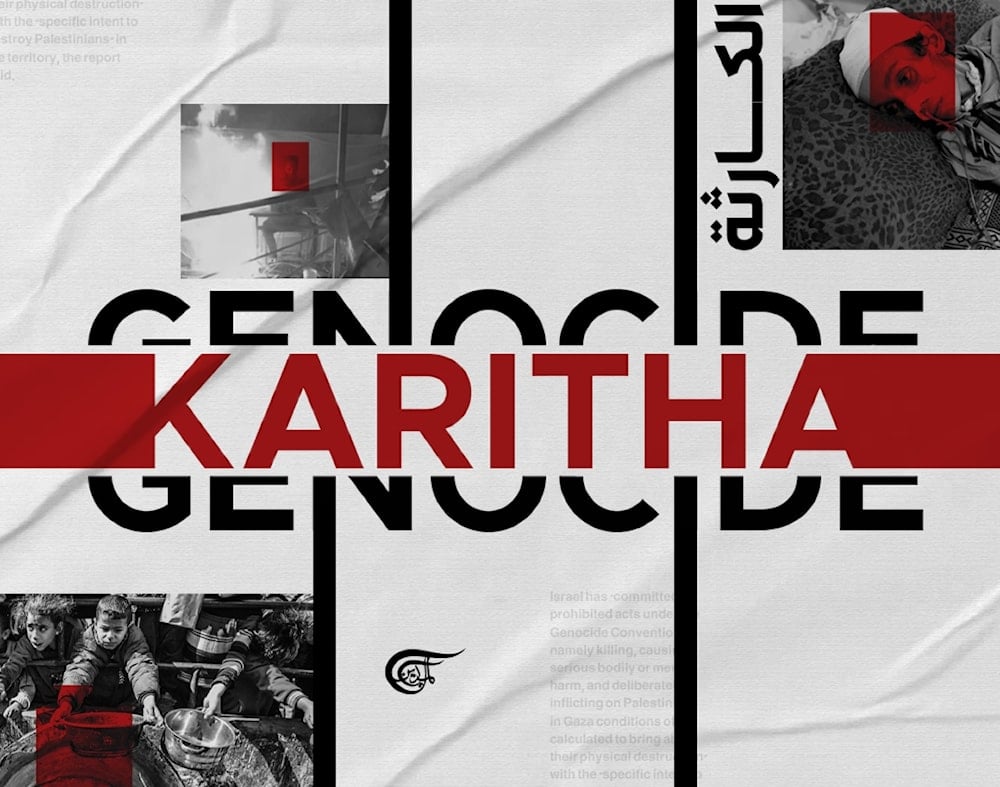Beyond genocide: Karitha is the truth the West cannot judge
Pasquale Liguori critiques how Western liberal discourse reduces the Palestinian genocide to symbolic capital, arguing that true understanding must emerge from Palestinian narratives like Karitha, beyond Western moral frameworks.
-

A free Palestine will not be born from a verdict at The Hague or a UN resolution. It will be born from this recognition: Karitha/genocide is not only pain, but seed. (Al Mayadeen English; Illustrated by Batoul Chamas)
Two recent editorials, penned by prominent voices of liberal-progressive critical thought, offer - albeit unintentionally - a glimpse beyond the most dishonest and grotesque aspects of Western commentary on Gaza. Omer Bartov, a professor of Holocaust and genocide studies at Brown University, writes in the New York Times that "Israel" is perpetrating a genocide in Gaza: a systematic destruction of a group, Palestinians, as such.
Adam Shatz, in the London Review of Books, portrays Gaza as the epicenter of a new regional order, in which "Israel", emboldened by its own devastating violence and backed by a rising global right, exercises unpunished imperial dominion, sustained by structural racism and a redemptive rhetoric of Jewish trauma.
These lengthy pieces, however, mask a lack of innocence behind the appearance of moral awakening. Bartov was among the first to cast doubt on whether a genocide was unfolding in Gaza. It took him no less than eight months of mass atrocities to finally “recognize” what had been glaringly evident in the weeks immediately following October 7th - already inscribed in Netanyahu’s calls for biblical vengeance against Amalek, and in statements by Israeli officials referring to Palestinians as “human animals.”
Bartov, who has taught genocide for 25 years, now acknowledges the genocidal nature of "Israel’s" actions, but only through an op-ed focused almost entirely on "Israel’s" moral crisis. His concern is a quintessentially Western one: What will happen to "Israel’s" ethical standing? What will become of Holocaust studies, of antisemitism research, of genocide discourse, after this rupture brought about by Gaza? Of Palestine itself, he says almost nothing. Bartov avoids any mention of self-determination, return, or liberation. He is vague, if not neutral, about the future: two states, one state, a confederation… all seemingly secondary. What matters to him is that "Israel" does not “turn into an apartheid state,” as if it had not already been one for decades.
Shatz, too, in his wide-ranging analysis of the regional context, ultimately brings everything back to the internal gaze of Western liberal culture. He denounces the instrumental use of antisemitism by the right, hopes for a democratic progressive awakening, and praises figures like Mamdani, a candidate for mayor in New York. Everything unfolds and resolves within the limits of liberal self-preservation: a world that criticizes "Israel" in order to save it, that denounces its brutality to prevent its collapse, that speaks of Palestine only to re-legitimize itself.
That a genocide is unfolding in Gaza is no longer a matter of debate. It is a raw, unvarnished fact, documented in real time. There is no need to wait for international tribunals, perhaps in a few years, perhaps never, nor to scour the Rome Statute for the precise legal classification. Genocide is a truth soaked in blood and history, not a terminological dilemma. It manifests in the systematic destruction of a people, in their engineered starvation, in the deliberate mass killing of children, in the erasure of homes, archives, hospitals, and of the very name “Palestine.”
And yet, just as the machinery of death becomes ever more efficient - Gaza buried alive under bombs - another dynamic emerges: subtle, insidious. In the West, the term “genocide” is being turned into a brand, a symbolic currency to be traded within the self-referential circuits of moral power. Denouncing genocide becomes a social passkey, a badge of credibility in the political-media circus. We witness, without much surprise, a phenomenon of appropriation: the Palestinian genocide becomes, for some, a narrative device through which to gain visibility, recognition, position, and benefit from their own self-centered stance.
A genocide in progress cannot be reduced to symbolic capital for institutional figures who, “in solidarity,” speak from a position of detachment. In this way, genocide ceases to be a searing truth and becomes an object of discourse - a watchword managed by subjects who turn it into a tool of self-representation.
This process has a name: moral expropriation. Genocide becomes a semiotic space for the narrative power of the progressive West, which absolves itself by claiming the merit of having “recognized” what it in fact allowed to happen - or worse, actively supported. The denunciation always comes too late, and in the meantime, Palestinians die. Not metaphorically: they die.
It must be said plainly: the word “genocide” does not belong to these people. It is not to be conjugated in the third person, nor turned into a hashtag for pitiful campaigns, nor converted into symbolic capital for pointless conferences. It is a word of history and blood. And the blood is Palestinian.
From this arises the urgent need to distinguish the genocide experienced from the genocide narrated; the burning reality from the instrumental discourse. Even on the cultural and semantic plane.
Gilbert Achcar, the Franco-Lebanese political scientist, recently used the Arabic term Karitha in Le Monde Diplomatique to describe the catastrophe unfolding in Gaza: a word denoting an absolute disaster, exceeding even the 1948 Nakba. That usage prompts a necessary distinction - not to replace the term “genocide,” which already carries the gravest weight, but to mark a boundary between the lived tragedy and its discursive caricature. Karitha is a cry, not a legal category. It demands no trials or verdicts. It seeks no recognition, but commands to be heard. Palestine has a voice that shatters the blackmail of external legitimation and affirms its own narrative outside the codes of Western legality and humanitarianism.
What matters is the language of decolonization, the lexicon native to Palestinian suffering, the radical act of naming catastrophe through one’s own world, history, and political spirituality. A discourse that dismantles and unmasks the instrumental use of the word “genocide,” returning it to the truth embodied in corpses, mourning, memory, and resistance. While the West squabbles in its chicken-coop debates over casualty counts and the intent behind mass killing, that word - Karitha - stands firm as a moral sentinel: not worse than genocide, but beyond genocide. It transcends it, restoring its full meaning. It liberates it from Western symbolic imprisonment and returns it to the soil, to the blood, to the sky over Gaza.
This is the genocide that does not ask for recognition from the UN, nor from the International Criminal Court, nor from NGO reports. It is Palestinian truth wrested from the arbitrariness of colonial language. It is the rupture point - where the humanity of the Palestinian people no longer needs mediators to be spoken, believed, to exist.
And only from this truth can what comes next begin to grow. A free Palestine will not be born from a verdict at The Hague or a UN resolution. It will be born from this recognition: Karitha/genocide is not only pain, but seed. Every massacre, every destruction is the foundation of a new identity, not one of victimhood, but of resistance. It demands not compassion, but justice. Not pity, but liberation.
In this sense, even the most “noble” Western attempts to name the Palestinian tragedy fail the moment they try to enclose it, to validate it through the technical strictures of an index of evil. “Genocide,” a terrifying word, has been degraded by academic, legal, and media dialectics. But Gaza has no time for these disputes. Gaza does not wait for the world to find a correct definition for its annihilation.
On this matter, Bartov and Shatz ultimately outline the limits of Western thought. But those limits must now be breached. Because on this side of the world, we can no longer claim the right to decide who is allowed to speak. We are a “civilization” that supports that genocide; how could we possibly claim the moral authority to nominate anyone for a peace prize?

 Pasquale Liguori
Pasquale Liguori
 8 Min Read
8 Min Read










